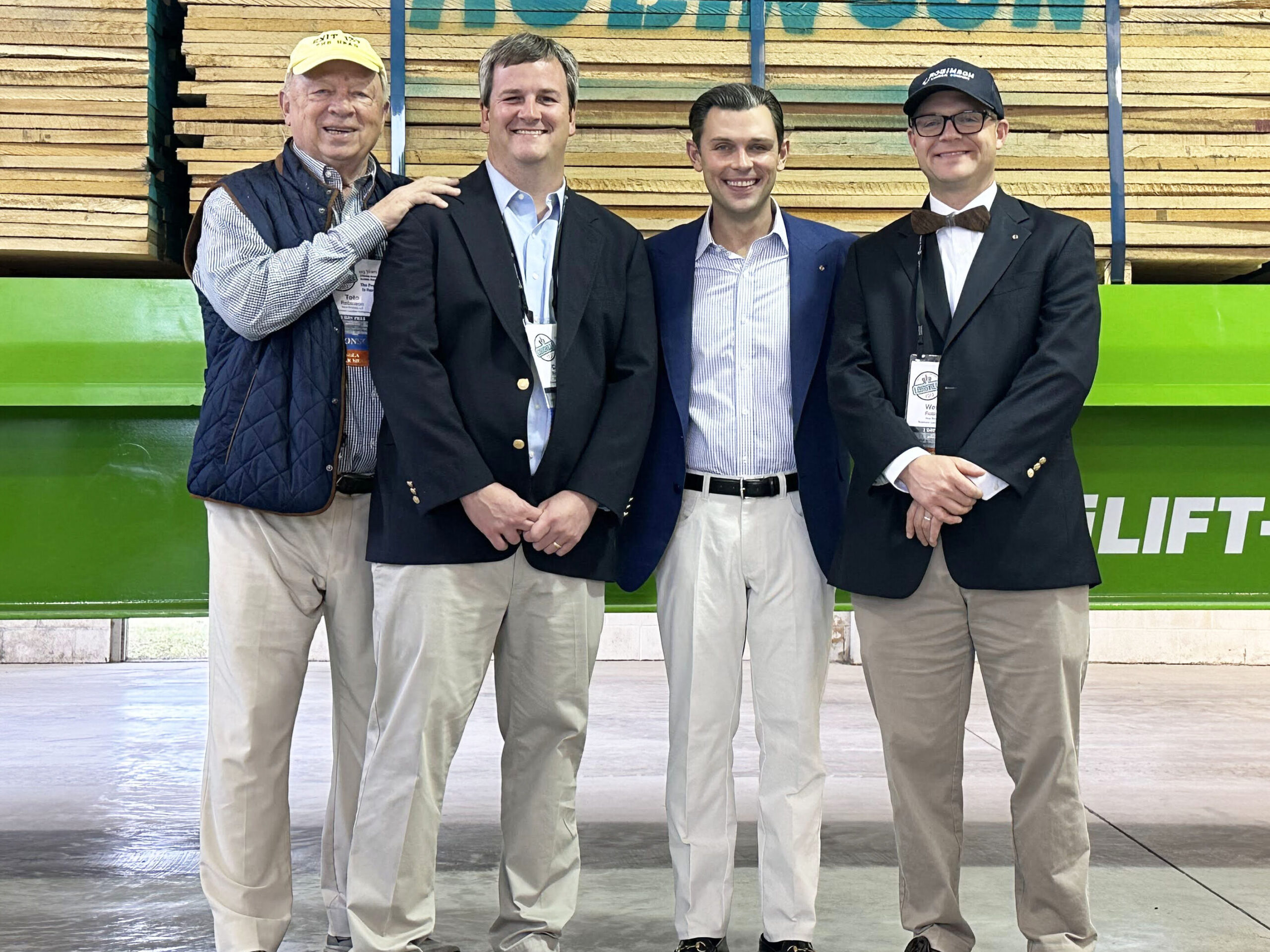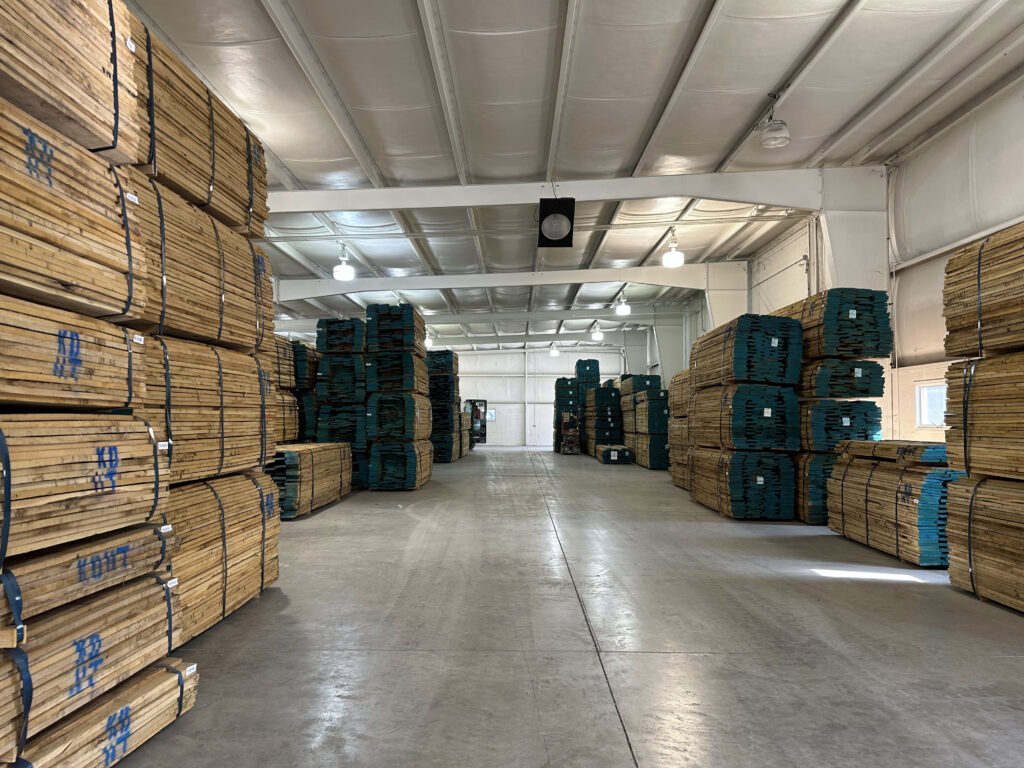Robinson Lumber Company may be one of the oldest family-owned businesses in Louisiana, but its leadership team is anything but stuck in the past. Now in its fifth generation of ownership, the New Orleans-based company is charting a bold course forward by investing in sustainability, automation and professional management while honoring a 132-year legacy.

Robinson Lumber Company, based in New Orleans, LA, honors a 132-year legacy. Pictured left to right is Toto, Court, Garner and Wes Robinson standing in front of their Combilift CSS container loading machine.
132-year Legacy
Founded in 1893 by Indiana railroad builder Charles Wesley Robinson, the company first made its mark exporting American long leaf pine to the Caribbean. The second generation (Robert Gibson Robinson) brought the company into the tropics, and the third generation (Jack, Charlie and Sam) expanded the business after coming home from World War II. Ivens, Courtney, Sam and Toto led the fourth generation, and today under the fifth generation (Court, Garner and Wes) Robinson is a global operation with customers in over 70 countries and a flagship concentration yard in New Albany, IN.

Robinson was an early adopter of VisionTally technology which it continues to employ at its flagship New Albany, IN, yard (pictured above).
The New Albany facility is especially known for producing high-quality White Oak, including ripped-to-width strips, along with premium Hickory and Ash. “We plan to continue investing in our yard and team,” said Court Robinson, the company’s vice president of manufacturing. In 2023 they opened a new kiln dried storage facility, with space for over a million board feet of inventory, as well as a state-of-the-art container loading system, which was featured during the NHLA Convention. In 2024, they cut the ribbon on six new kilns which increase their annual kiln drying capacity to over 6 million board feet. And most recently in 2025, they took delivery of a brand-new forklift fleet which includes two all-electric models.

The company recently purchased an additional four acres of land adjoining its New Albany yard and opened a new kiln dried warehouse to streamline outbound shipping.
“I’m proud of how the fifth generation has carried forward our legacy, not just by honoring the company’s history, but by leading with the values that have defined us for over a century: passion, generosity and a drive to keep growing. That’s what it means to be a values-based family business.”
– Toto Robinson, executive vice president, Robinson Lumber Company
The company is FSC certified and maintains robust, sustainable supply chains through long-standing partnerships across the U.S., Latin America, Africa and Europe. Robinson boasts a remarkable global sales and sourcing footprint, with offices in 11 countries and seven U.S. states. “We speak the local language pretty much everywhere in the world,” said Wes Robinson, hardwood lumber manager. “That allows us to work closely with suppliers and customers alike, wherever they are.”

Toto Robinson and Hank Marchal present Wes Robinson (center) with an award for sales person of the year.
International Model
Robinson’s roots may be global, but its commitment to American hardwood producers remains foundational. “A strong domestic supply chain is the backbone of our business,” said Chad Hammonds, vice president of North America. “We buy from mills across all 33 U.S. hardwood producing states, and we take pride in supporting independent producers who share our standards for quality and sustainability.” By consistently sourcing and promoting U.S.-grown hardwoods and softwoods, Robinson plays an important role in keeping American lumber competitive in both domestic and export markets.
The company has evolved significantly over the decades. Once owning foreign mills across Latin America and operating its own breakbulk vessels to move cargo from them, today Robinson runs a leaner international model, working through strategic partners rather than owning overseas assets. “We prefer variable costs to fixed costs,” said Garner Robinson, the company’s CEO. “If volumes drop during a trade shock, we need to stay nimble.” That philosophy helped the company weather the 2008 housing crash and the 2018 trade war.

Brand new steam fittings for the company’s bank of kilns.
Proud of Partnerships
Projects supplied by Robinson include high-profile landmarks like the French National Library in Paris, the Copenhagen Airport, Lord’s Cricket Grounds in the UK, New York’s Museum of Modern Art, the Ryman Auditorium in Nashville, and even the WWII Museum in New Orleans. “We may not always be named, but the wood tells our story,” said Hank Marchal, managing director for Europe.
Robinson Lumber’s long-term partnerships are a point of pride. “We have customers we’ve worked with for over three generations,” said Dan Lennon, vice president of imports. “That doesn’t happen by accident. It takes consistency, trust and showing up year after year—especially when times are tough. That durability reflects Robinson’s long-view approach to every relationship.”
Robinson Lumber’s leadership structure is another rarity. Many family businesses struggle with unclear succession or diluted ownership. Robinson has avoided these pitfalls by requiring each generation to purchase the company from the one before. “It’s never been inherited,” said Garner Robinson. “For five generations, the business has been bought and sold from one working generation to another. That means that the family members involved are all in.” The company pairs that structure with a commitment to professional management, empowering non-family executives in key leadership roles while preserving the culture of a values-driven, family-owned business. “That clarity matters to our employees and customers,” said Garner. “They know we’re committed.”

With 75 employees worldwide, the company is intentionally sized to be agile but resourceful. “We’re a professionally managed family business,” said CFO Cliff Worley. “That means combining legacy values with top-tier execution.” Sales Manager Steve Stoufflet, who has spent more than four decades with the company, echoed that sentiment: “I don’t have to worry about someone constantly looking over my shoulder and micromanaging my work. They hire people who are highly motivated and whose goals align with theirs and then let them do their jobs.”

As the company moves into its next decade, it is placing big bets on sustainable products, AI integration and international growth. One area of increasing attention is public awareness around the sustainability of wood itself. “Wood is the world’s ultimate renewable resource,” said Wes Robinson. “It grows on solar power, it stores carbon and it can be reused or returned to the earth. As an industry we haven’t explained that effectively to consumers.” He notes that the American hardwood sector in particular has struggled to tell its sustainability story, often overshadowed by the petrochemical complex behind plastics, composites and vinyl. But that tide may be turning. “With growing concern about PFAS and microplastics, we might finally be reaching an inflection point,” he said. “Consumers are starting to ask the right questions—and wood has the answers.”

For more information, visit roblumco.com.






